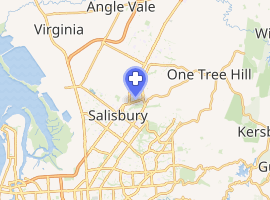Lyell McEwin Hospital
The Lyell McEwin Hospital (LMH) is a major tertiary hospital located in Adelaide, South Australia that provides medical, surgical, diagnostic, emergency and support services to a population of more than 300,000 people living primarily in Adelaide's north and north eastern suburbs. It is affiliated with the University of Adelaide and the University of South Australia. It is named after Sir Lyell McEwin, a long-serving member of the South Australian Legislative Council and the leader of the Liberal and Country League in that chamber.
| Lyell McEwin Hospital | |
|---|---|
| Northern Adelaide Local Health Network | |

| |
| Geography | |
| Location | Elizabeth Vale, Adelaide, South Australia, Australia |
| Coordinates | 34.7478°S 138.6651°E |
| Organisation | |
| Care system | Public Medicare (AU) |
| Type | Teaching |
| Affiliated university | University of Adelaide University of South Australia |
| Services | |
| Emergency department | Yes |
| History | |
| Opened | 22 April 1959 |
| Links | |
| Website | SA Health |
| Lists | Hospitals in Australia |
Opening as a small country hospital in 1959, LMH is today recognised as a leading teaching institution for health care professionals. It works closely with the Muna Paiendi Aboriginal Community Health Centre, located on site.
It is the only hospital in South Australia providing new mothers and their babies the Mothercarer postnatal support service, and one of only two tertiary teaching hospitals in the state to receive Baby Friendly Health Initiative Accreditation according to World Health Organization guidelines.
Redevelopment
In recent years, LMH has undergone rapid and extensive expansion of its services and facilities. In 2002 the hospital commenced its $314 million[1], three-part redevelopment program as part of the State Government's modernisation of the state's health system, and to meet the increasing needs of the growing northern suburbs and surrounding areas. In October 2003 Premier Mike Rann and Health Minister Lea Stevens opened state-of-the-art maternity, obstetrics and gynaecology sections, as well as a new women's and children's area.[2]
Stage A of the hospital's redevelopment was completed in 2004 and replaced much of the hospital's core clinical and support infrastructure. In April 2005 Premier Rann and Health Minister Stevens opened six new operating theatres, a new Emergency Department, new medical imaging facilities and women's health consulting and treatment facilities.
Key elements of the Stage B redevelopment, include a 50-bed, acute and aged care mental health facility, a Radiation Oncology unit, enhanced medical and palliative services, the establishment of an extended emergency care unit, day surgery and ambulatory services and the expansion of support services. In August 2008 Premier Rann opened three new areas of the Lyell McEwin Hospital as part of the government's $336 million redevelopment, including new pathology, oncology and gastroenterology units.[3]
Stage C of the hospital's redevelopment, included a multi-level staff and visitor car park (completed early 2010) and an additional 96 inpatient beds. Other improvements in the redevelopment included a helipad facility, teaching and research spaces, a new cardiac catheter laboratory, a second CT scanner and installation of a new MRI machine.[1]
Surgical services
Lyell McEwin Hospital is a major hospital for emergency, complex and multi day surgery, as well as providing day surgery and other procedures.
In 2016, a comprehensive 24-hour, seven-day orthopaedic trauma surgery service was expanded at Lyell McEwin Hospital which provides faster access to orthopaedic surgery for residents in the north and north eastern suburbs.
Radiology services are contracted out to Everlight Radiology.[4]
Inpatient services[5]
- Adult and Older Persons’ Mental Health
- Allied Health
- Antenatal
- Breast/Endocrine Surgery
- Cancer Services (Chemotherapy and Radiotherapy)
- Chronic Disease Management
- Diabetes Education Centre
- Diabetes and Endocrinology
- Ear, Nose and Throat
- Gastroenterology
- General Medicine
- Gynaecology/Colposcopy
- Haematology
- Infectious Diseases
- Intensive Care
- Interdisciplinary High Risk Diabetes Foot Clinic
- Ophthalmology
- Orthopaedics/Fracture
- Palliative Care
- Paediatric
- Perinatal Mental Health
- Peri-Operative
- Renal
- Respiratory
- Stroke/Neurology
- Upper Gastrointestinal
- Urology
- Vascular Surgery
Outpatient services[5]
- Allied Health
- Breast/Endocrine Surgery
- Cardiology/Interventional Cardiology/Electrophysiological studies
- Colorectal Surgery
- Diabetes and Endocrinology
- Ear Nose and Throat Surgery
- Early Rehabilitation
- Emergency Medicine and Surgery
- Gastroenterology
- General Medicine
- Haematology
- Hospital at Home
- Infectious Diseases
- Medical Imaging
- Medical Oncology
- Neonatal
- Obstetrics
- Obstetric Medicine
- Ophthalmology
- Orthopaedics
- Orthogeriatrics
- Paediatric Surgery
- Pathology
- Peri-Operative Medicine
- Plastic Surgery
- Radiation Oncology
- Renal Dialysis
- Renal Medicine
- Respiratory Medicine and Bronchoscopies
- Stroke/Neurology
- Upper Gastrointestinal Surgery
- Urology
- Vascular Surgery
Staff at LMHS
- Northern Adelaide LHN CEO Ms Jackie Hanson
See also
References
- "SA Health – Lyell McEwin Hospital". SA Health. Archived from the original on 27 August 2017.
- SA Government News Release, Friday 17 October 2003
- SA Government News Release, 12 August 2008
- "Radiology to be outsourced at Lyell McEwin Hospital after recruiting bid fails". ABC. 14 December 2016. Retrieved 28 May 2018.
- "Services at Lyell McEwin Hospital". SA Health. Archived from the original on 6 May 2013.